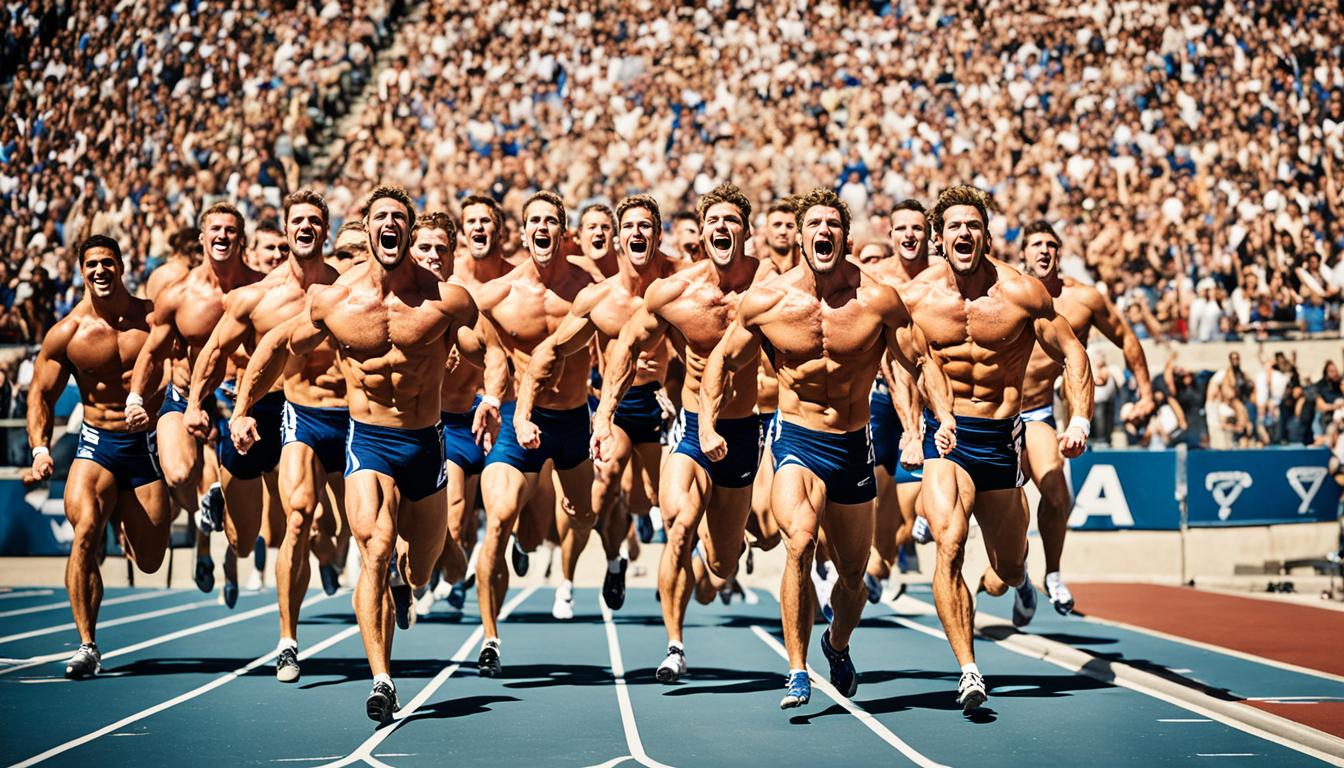Welcome to the fascinating world of ancient Greece, where the Olympic Games were far from what we know today. In this article, we’ll explore the unique aspects of the ancient Greek naked Olympic games and how they played a significant role in Greek society and culture.
Key Takeaways:
- Athletes in ancient Greece competed naked to showcase their physical power and pay tribute to the Greek God Zeus.
- The nudity also served as a means to intimidate other competitors and inspire athletes to train harder.
- Ancient Greek heroes, often depicted nude in artwork and sculptures, served as role models for the athletes.
- The ancient Olympic Games began in 776 B.C. as part of a religious festival honoring Zeus and lasted for nearly 12 centuries.
- Winners of the ancient Olympics received a crown made of olive leaves and a cash prize equivalent to about $100,000 U.S. dollars.
The Origins of the Ancient Olympics
Discover the rich history behind the ancient Greece Olympics and the beginnings of ancient Greek athletic competitions. The origins of this storied tradition can be traced back to 776 B.C., when the first Olympic Games commenced as part of a religious festival dedicated to Zeus, the King of the Greek Gods. Athletes from various city-states gathered in Olympia to compete in a footrace known as the stadion, marking the birth of the ancient Olympic Games.
The ancient Olympics quickly grew in importance and became a central aspect of Greek life. Held every four years, the games spanned nearly 12 centuries and drew competitors and spectators from across the Greek world. The Olympics provided a platform for athletes to showcase their physical prowess, honor the gods, and inspire others through their achievements.
“The modern Olympics were revived in 1896.”
The ancient Olympic Games came to an end in 393 A.D. when the Roman Emperor Theodosius banned all pagan festivals, including the Olympics. The games remained dormant for over a millennium until their revival in 1896. Today, the modern Olympics continue the spirit of competition and celebration that originated in ancient Greece, paying homage to the historic athletic traditions that captivated the ancient world.
Ancient Greek Olympics Timeline
| Year | Event |
|---|---|
| 776 B.C. | The first Olympic Games begin with a footrace. |
| 393 A.D. | The Roman Emperor Theodosius bans the games. |
| 1896 | The modern Olympics are revived. |
Sports and Events in the Ancient Olympics
In the ancient Olympics, athletes competed in various sports and events that showcased their physical abilities and athleticism. These events were an integral part of the games, attracting participants and spectators from different Greek city-states.
Initially, the ancient Olympics featured only one event, the stade. This footrace was a short sprint that covered the length of the stadium, approximately 192 meters. However, as the games evolved and gained popularity, new events were introduced to test the skills and strength of the competitors.
“The ancient Olympics offered a unique platform for athletes to showcase their talents and compete against the best of the best.”
One of the additional events was the diaulos, also known as the double-stade race. This race required athletes to cover twice the length of the stade, making it a challenging test of speed and endurance.
The dolichos, a long-distance race, was another prominent event in the ancient Olympics. Athletes had to run a predetermined distance, typically ranging from 7 to 24 laps around the stadium, depending on the year.
Wrestling was a popular combat sport, and it became a staple of the ancient Olympics. Wrestlers engaged in physical confrontations to prove their strength and grappling abilities. This event attracted fierce competition and enthusiastic spectators.
The pentathlon was a combination of five disciplines: the stade, diaulos, long jump, discus throw, and javelin throw. It tested the overall athletic prowess of the competitors, encompassing their speed, strength, and agility.
“The ancient Olympics were a testament to the physical capabilities of the human body, pushing athletes to their limits and celebrating their achievements.”
Chariot racing and horse racing were also popular events held in the hippodrome, adjacent to the main stadium. These events showcased equestrian skills and provided thrilling entertainment for the spectators.
To emphasize the athletes’ physical abilities, most events in the ancient Olympics were held in the nude. This tradition of nudity symbolized the athletes’ connection to the gods and represented their willingness to present themselves in their most natural and powerful state.
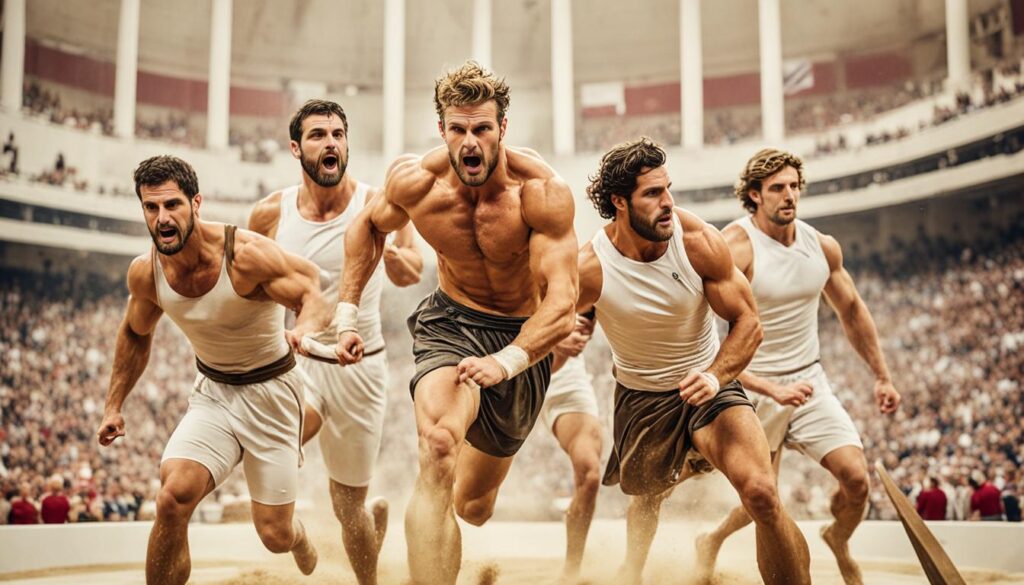
“The nudity in ancient Greek sports exemplified the physical prowess and dedication of the athletes in the ancient Olympics.”
Prizes and Rewards in the Ancient Olympics
Winning in the ancient Olympics brought great honor and recognition to the athletes. The rewards for their achievements were not only symbolic but also valuable.
“The glory of victory was just as important to the athletes as the physical triumph. The fame and prestige that came with winning were highly cherished.”
The winners of the ancient Olympic Games were crowned with olive leaves, symbolizing peace and victory. This olive wreath, known as the “kotinos,” was a coveted prize that served as a tangible symbol of the athlete’s success and dedication.
However, the rewards were not limited to the crown alone. Winners also received a cash prize, an equivalent of about $100,000 U.S. dollars in today’s currency. This significant monetary reward was a powerful motivation for athletes to strive for excellence and compete at their best.
The Significance of Winning in Ancient Greece
In ancient Greece, winning in the Olympic Games held great significance for both athletes and society. The Greeks believed that achieving victory in these prestigious athletic competitions could bring about a form of immortality.
Greek legends often portrayed death as a fearsome experience, but winning in athletics provided athletes with an opportunity to transcend mortality and achieve a lasting legacy. The glory and honor associated with Olympic victories allowed winning athletes to be remembered and revered throughout the ages.
Winning athletes were commemorated through various means to ensure their legacy endured. Statues were sculpted in their honor, immortalizing their likeness in stone. Songs and poems were composed to celebrate their achievements, their extraordinary feats forever celebrated in verse.
These tributes to their success not only elevated the individual athletes but also served as a source of inspiration for future generations of competitors. The achievements of these triumphant athletes became legendary, influencing and motivating others to strive for greatness.
“Winning an Olympic event in ancient Greece meant securing a place in history. The statues erected in your honor would stand as a testament to your greatness, and the songs written about your achievements would echo through the ages, ensuring your memory endured.”
Achieving Immortality through Victory
Winning in ancient Greek athletic competitions offered a chance for athletes to surpass the limitations of their mortal existence. By pushing their physical limits and emerging victorious, athletes believed they could secure a form of immortality that would be remembered and revered for generations to come.
The ancient Greeks viewed athletic prowess as a reflection of divine favor and a display of heroic qualities. Successful athletes were compared to mythical heroes such as Hercules and Achilles, who were celebrated for their exceptional strength, courage, and skill.

The Lasting Impact of Olympic Victories
Winning an Olympic event in ancient Greece extended far beyond personal achievement. It brought glory to the athlete’s city-state and elevated the status of their family. The Olympics served as a platform for city-states to showcase their power, influence, and athletic prowess to the wider Greek world.
Furthermore, the victories and legacies of these athletes became intertwined with the cultural fabric of ancient Greece. Their accomplishments were immortalized in art, literature, and oral traditions, ensuring their stories and feats would be passed down through generations.
The Power of Athletic Greatness
Athletic greatness in ancient Greece extended beyond mere physical strength and skill. It represented the potential for individuals to transcend their mortal limitations and be enshrined in the annals of history. By vying for victory in the ancient Olympics, athletes sought to secure their place among the gods and heroes, living on through the ages as symbols of human achievement.
Women in the Ancient Olympics
In ancient Greece, women were not allowed to compete in the same games as men during the Olympic Games. However, there were still opportunities for women to participate in athletic competitions. Unmarried women could partake in the Heraian games, which focused on footraces. This allowed them to showcase their speed and athleticism, albeit in a separate event from the male-dominated Olympic Games.
Another way women could be involved in the ancient Olympics was through their role as owners or trainers of racehorses. Women who owned successful racehorses could enjoy the prestige of victory, even if they were not physically competing themselves. This presented an avenue for women to participate in the games and gain recognition for their support and involvement in the sporting events.
| Opportunities for Women in Ancient Greek Sports |
|---|
| Unmarried women could participate in the Heraian games focused on footraces. |
| Women could be winners in the games as owners or trainers of racehorses. |
The Audience and Atmosphere at the Ancient Olympics
The ancient Olympics captivated a massive audience, with an estimated attendance of up to 50,000 people. Individuals from across the Greek world eagerly traveled to Olympia to witness the grandeur of the games. Although the atmosphere was electric, the conditions at the event often left much to be desired. Accommodations were limited, and overcrowding was a common issue. Furthermore, there was no water supply, which added to the discomfort of both athletes and spectators.
Despite these challenges, the spectators were deeply engaged in the competitions. They cheered enthusiastically for their favored athletes, placing bets and exhibiting their passion. The games brought out a range of emotions in the audience, and they never hesitated to demonstrate their opinions on the results. The ancient Olympics created an electric atmosphere, connecting people from various regions and fostering a sense of unity and camaraderie.

Ancient Olympics Spectators’ Opinions
“The ancient Olympics were a spectacle unlike any other. The sheer volume of spectators and their fervent cheering made it an unforgettable experience. Despite the uncomfortable conditions, we were captivated by the athletic prowess on display.”
| Ancient Olympics Audience | Key Characteristics |
|---|---|
| Size | Up to 50,000 attendees |
| Origin | People from all over the Greek world, including city-states and rural areas |
| Atmosphere | Enthusiastic cheering, betting, and lively discussions |
| Comfort | Limited accommodations, overcrowding, and no water supply |
Athletes and Professionalism in Ancient Greece
In the early days of the ancient Olympics, athletes were primarily young men who received training as part of their education. They honed their skills and physical prowess to participate in the revered athletic competitions of ancient Greece. As the games grew in popularity, athletes started to adopt a more professional approach to their athletic pursuits.
Athletes understood the potential rewards and glory that came with achieving victory in the ancient Greek athletic competitions. Some of them received monetary prizes from their home city-states or wealthy sponsors. These financial incentives provided athletes with the means to focus solely on their training, intensifying their dedication and commitment to their respective sports.
Winning in the ancient Greek athletic competitions opened doors for athletes, granting them opportunities beyond the arena. Victorious athletes could leverage their successes as stepping stones for other careers, such as joining the military or becoming influential figures in their communities. Their triumphs elevated their status, paving the way for future achievements and recognition.
| Athlete Benefits in Ancient Greece | Examples |
|---|---|
| Monetary Prizes | Financial rewards from city-states or sponsors |
| Professional Opportunities | Potential military careers, influential roles in society |
The dedication and professionalism of the ancient Greek athletes contributed to the enduring legacy of the Olympic Games. Their pursuit of excellence, motivated by both honor and gain, showcased the importance of physical prowess and athleticism in Greek society. Furthermore, it laid the foundation for the modern professional athlete, inspiring generations of athletes to strive for greatness.
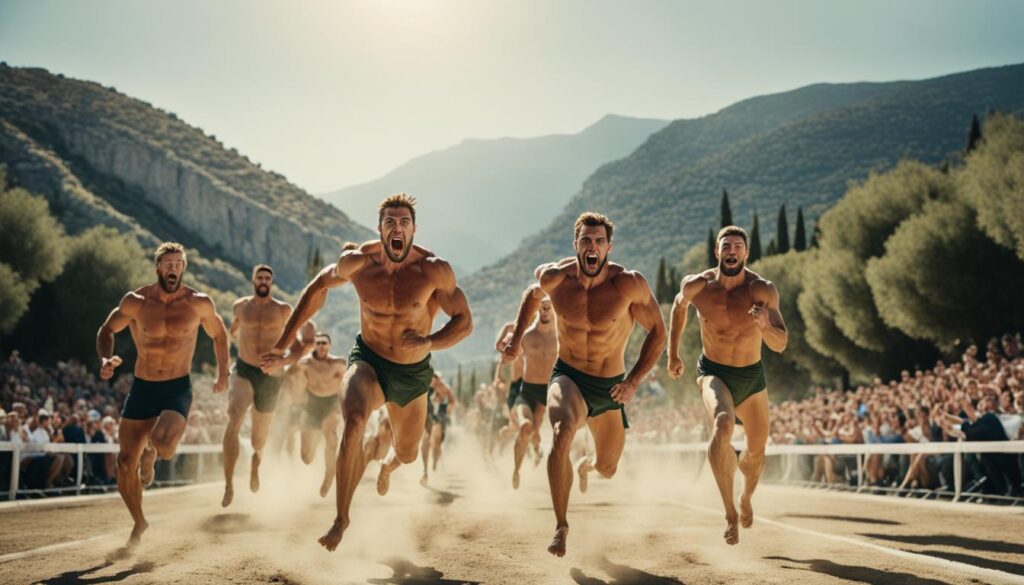
As the games evolved, so did the athletes who participated in them. The professionalization of athletic competitions in ancient Greece not only elevated the status and reputation of these athletes but also left an indelible mark on the history of sports as a whole.
The Tradition of Competing Naked in Ancient Greece
In ancient Greece, the tradition of competing naked in sports was deeply rooted in religious and cultural beliefs. Nudity symbolized presenting the natural human form as a tribute to the gods. It was believed that by revealing their bodies, athletes showcased their strength and readiness for combat. In a society often facing conflicts, this display of physical prowess was highly valued.
The tradition of nudity in ancient Greek sports also served as a cultural marker. Greeks considered themselves superior and believed that their way of life was the epitome of civilization. The nudity of the athletes became a visual representation of their Greek identity.
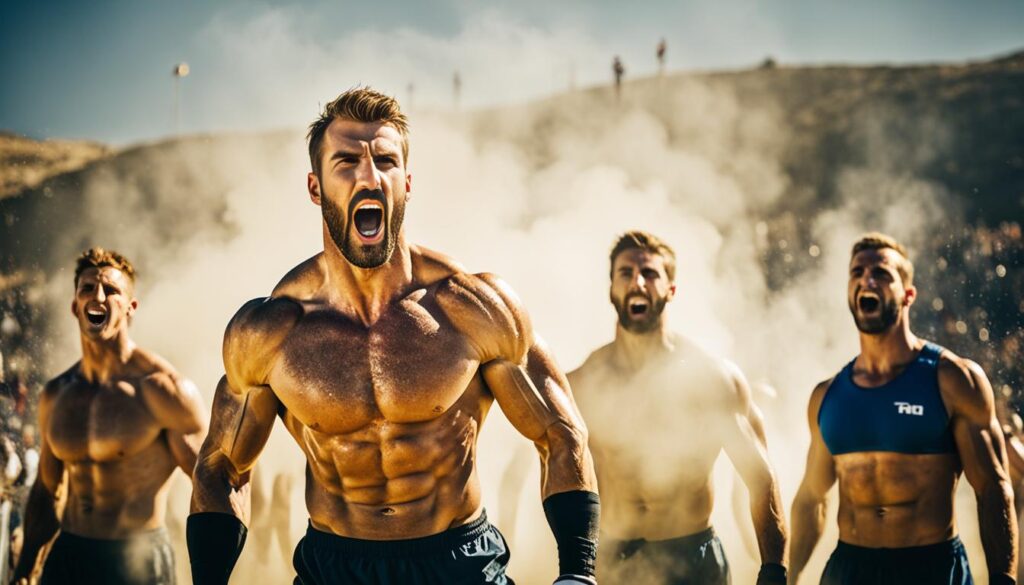
This tradition was especially prevalent in the ancient Olympics, where athletes competed in events such as running, wrestling, and the pentathlon in the nude. By removing clothing and competing in their natural state, athletes sought to embody the ideals of physical perfection and strive for excellence.
“Nude, I am brave; clothed, I am cowardly.” – Epirotan athlete Nikokles
The nudity of the athletes not only impressed the spectators but also inspired awe and reverence. Greek sculptures, paintings, and pottery often depicted athletes in their naked glory, celebrating the beauty and athleticism of the human body.
Comparing Ancient Greek Nudity Traditions with Modern Sports Attire
| Ancient Greece | Modern Sports | |
|---|---|---|
| Clothing | Nude | Uniforms/attire specific to each sport |
| Purpose | Honor gods, showcase strength, and Greek identity | Reflect team identity, enhance performance, and meet safety standards |
| Impact | Inspire awe and reverence, celebrate physical beauty | Foster team spirit, promote brand image |
| Practicality | Freedom of movement, minimal hindrance | Designed for specific sport requirements |
The tradition of competing naked in ancient Greece was not only a testament to physical prowess but also a reflection of the cultural and religious values of the time. It served as a visual representation of Greek identity and a celebration of the human form, inspiring awe and reverence among spectators.
Sponsors and Support for the Ancient Games
The ancient Olympic Games, held in ancient Greece, were not only a showcase of athletic prowess but also relied on the support of sponsors and patrons. These individuals and city-states recognized the significance of the games and understood the promotional opportunities they presented.
Among the sponsors of the ancient Olympic Games were kings, politicians, and prominent city-states such as Athens, Sparta, Corinth, and Syracuse. Their contributions were essential for organizing and hosting the games, ensuring their successful execution.
For the sponsors, supporting the ancient Olympics offered a chance to boost their reputation and promote the prestige of their cities or themselves. By associating with the prestigious event, sponsors aimed to elevate their standing in the eyes of the Greek population and beyond.
Athletes who participated in the ancient Olympics also benefitted from sponsor support. Some received gifts from their sponsors, including food, clothing, land, and monetary prizes. These rewards not only incentivized athletes to compete but also provided them with material resources to support their training and livelihood.
The Role of Sponsors in the Ancient Olympics
The sponsors of the ancient Olympic Games played a crucial role in upholding the traditions and cultural significance of the event. Their financial contributions and gifts to the athletes helped ensure the continuity of the games throughout the centuries.
“The ancient Olympic Games would not have been possible without the support and sponsorship of kings, politicians, and leading city-states. Their contributions helped organize the games and provided athletes with the means to compete at their best.”
The dedication and patronage of sponsors contributed to the success and continued legacy of the ancient Olympics. Through their support, these sponsors shaped the development of the games and helped create an enduring tradition that carries on to this day.
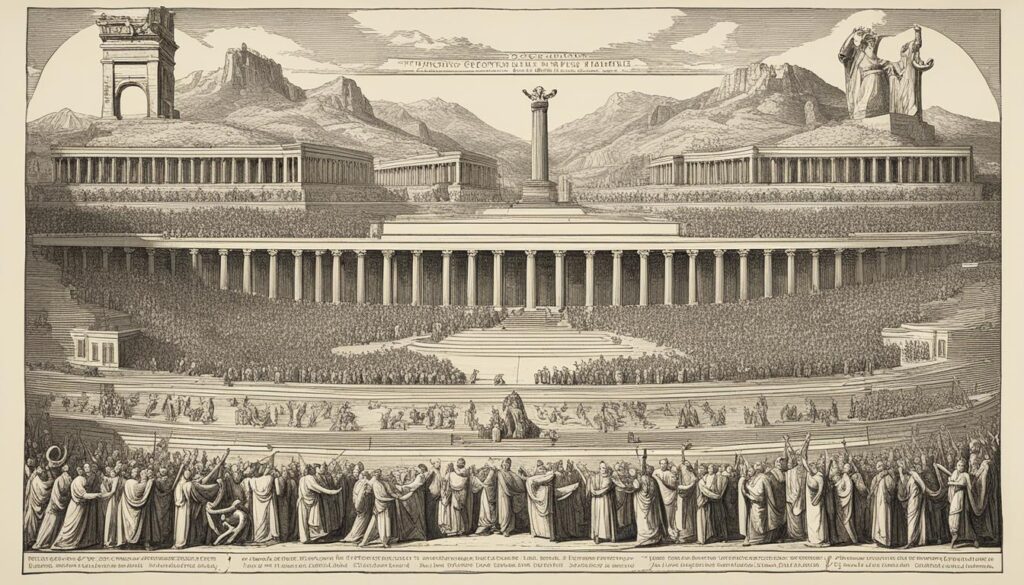
The Legacy and Impact of the Ancient Olympics
The ancient Olympics left a lasting legacy on Greek society and had a profound impact on its culture. These games were not merely athletic competitions; they were a central part of Greek life and reflected the religious and civic values of the time.
The games served as a symbol of unity and brought together people from different city-states across Greece. Athletes and spectators alike gathered in Olympia to celebrate the spirit of competition and honor the Greek gods.
One of the most significant contributions of the ancient Olympics was their promotion of peace. During the games, a sacred truce was observed, allowing athletes and spectators to travel safely to and from Olympia. This period of temporary ceasefire provided a respite from conflicts and encouraged diplomacy among the city-states.
“The ancient Olympics not only showcased physical prowess but also celebrated the ideals of harmony, respect, and fair play.”
Furthermore, the revival of the Olympics in the modern era continues to celebrate the enduring legacy of the ancient Games. Today, the Olympic movement still represents the pursuit of excellence, the celebration of diversity, and the power of athletic drive and determination.
By embracing the legacy of the ancient Olympics, we recognize the importance of physical and mental strength, healthy competition, and global unity through sports. These values resonate with people of all ages and cultures, reminding us of the enduring impact of the ancient Greek Olympics.
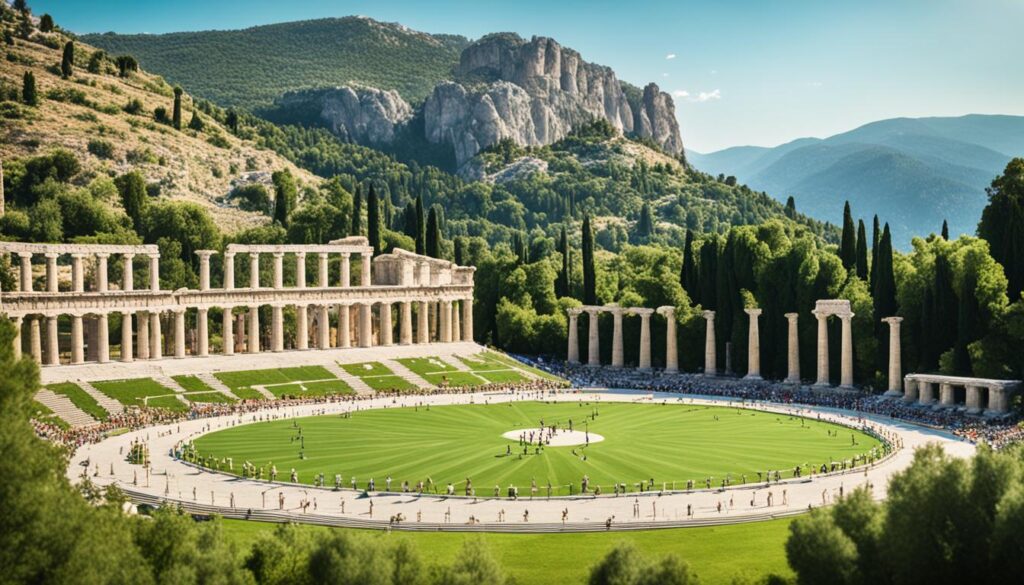
| Ancient Olympic Legacy | Impact |
|---|---|
| Promotion of peace | Temporarily suspended conflicts and encouraged diplomacy |
| Unity among city-states | Brought together people from different regions of Greece |
| Celebration of excellence | Inspired individuals to strive for greatness in their chosen fields |
| Global significance | The revival of the Olympics in the modern era continues to captivate the world |
Conclusion
The ancient Greek naked Olympic games were a fascinating display of athleticism, religious devotion, and cultural significance. Athletes competed in the nude as a way to pay tribute to the gods, showcasing their physical prowess and inspiring others to push their own limits. This unique tradition not only honored the Greek heroes and mythical figures but also created a lasting impact on Greek society.
The Olympics served as a central part of Greek life and their influence spanned nearly 12 centuries. From the humble beginnings in 776 B.C. as part of a religious festival to the massive spectator events attracting up to 50,000 people, the games became a symbol of Greek unity and celebration. Winning in the Olympics was considered a path to immortality, with victorious athletes immortalized through statues and songs.
Even today, the legacy of the ancient Olympics continues to captivate the imagination of people worldwide. The revival of the modern Olympics in 1896 pays homage to the enduring spirit of competition, sportsmanship, and human achievement. The ancient Greek naked Olympic games exemplified the values and ideals held dear by the Greeks, leaving a lasting mark on both their history and the way we perceive athletic endeavors.
